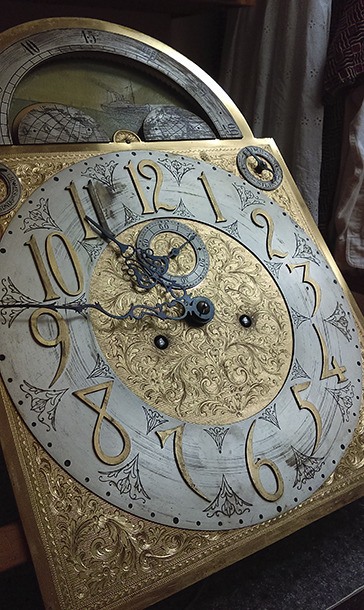It is not about killing time.
Actually, quite the opposite.
Jim Mann’s retirement passion is very much about treasuring time. Both his own, by doing good through work he loves, and the things which have withstood it, by returning them to reliable working condition to be enjoyed by generations yet to come.
When a client brings him something broken — mysteriously, persistently broken and nobody knows why — that is when Mann is happiest. Then, in his spotless, well-lit workspace, he can begin to solve the mystery, which might be his favorite part of all.
A retired marine machinist, Mann and his wife Gail operate a repair business from their Bainbridge Island home.
He fixes and maintains clocks, as well as sewing machines and music boxes. She researches the providence of each project, discovering the often surprising past of each new piece that comes through their door, while her husband is downstairs digging into the springs, dials and gears.
“He’s always, always been interested in fixing things,” Gail said. “He just had that curiosity and the skill to do that sort of work.”
What began as an attempt to repair his wife’s sewing machine — a successful attempt, too — quickly made Jim aware of a greater need.
“I would fix her machine and pretty soon I was fixing her friends’ machines,” he remembered. “And Gail, in order to keep me out of trouble, suggested I go to school and learn formally.
“I resisted,” Jim laughed. “Like I do most everything.”
Eventually he agreed, though, and found the experience incredibly appealing.
He attended and completed a class in Portland, Oregon, wherein he was instructed and certified in sewing machine repair. He came home and began advertising his services, but it was another personal job that put him on to the idea of working on clocks.
When two of their own at home stopped working properly, Jim, in true Jim fashion, took them apart and fixed them.
“Pretty soon friends started bringing me their clocks,” he said. “My family started bringing clocks. So Gail said, ‘Go back to school.’”
Education is critical in clock repair, Jim explained, as there’s simply so very much to know.
The required training to work in the industry, let alone become an actual clockmaker, he said, is extensive.
“I didn’t get a certification,” Jim explained. “To be a clockmaker, I think I’d rather try to go be a doctor. It’s quite an education.”
He did, however, learn enough to, as they say, be dangerous. Several courses and a lot of personal research later, and Jim was confident enough to begin offering clock repair — not watches, but mechanical wall clocks, grandfather clocks and mantle clocks — alongside his sewing machine services.
Music boxes, actually quite similar to clocks mechanically, he said, were another unexpected avenue his new business took when a customer asked him to take a look at one.
But all the projects Jim undertakes share a common theme: They are all dearly beloved possessions, some of them very old, in need of attention in a national marketplace that has become designed more around the concept of easy replacement rather than repair.
“The thing about clocks is that they mean a lot to people,” Gail explained. “They may have been in their families for generations. People don’t want to turn their clock over to somebody who isn’t good at what they do. There’s a certain amount of trust that goes into turning that clock over.”
After fixing a clock, both Gail and Jim agreed that it feels good to be a part of a special experience, to perhaps give something back to the client.
“One man that he fixed a clock for hadn’t heard it chime since he was about 12 years old,” Gail said. “And when Jim set it up and set the chimes, he burst into tears.”
Sewing machines, too, she said, are often treasured heirlooms as well as tools themselves. And whatever important items are created with the newly repaired machine — fanciful costumes, elegant clothing, works of art or simple necessary stitching — is an achievement that they can then share in as well.
Jim completed work for nearly 300 clients last year -—not including some volunteer sewing machine repair work he has done for several local schools and Purdy Womens Correctional Facility — though the number of jobs per month can vary greatly.
But that’s actually another thing he likes about the business. He can take the time to do things right.
“This business is not our livelihood,” he said. “So I’m able to work with my customers without the concern of, ‘Jeez, I’m not making money on this customer.’
“It’s a learning curve for me,” he admitted. “But I don’t have to sweat it.
If I don’t have any clocks or sewing machines tomorrow, I’ll go fishing,” he laughed.
Jim said he considers the ability to sit down and fix something oneself to be a vanishing skill in today’s culture and was glad when he was asked to do some work on sewing machines for a local school’s home economics class, a sign of renewed interest in the trades, he said.
“I really love when somebody brings me a broken sewing machine or a broken clock,” he laughed. “Just to bring one in to service it is kind of a no-brainer. When it doesn’t work, I love that. That’s what I like the most.”
Visit www.biclocks.com or call 206-780-9648 for repair services and costs.



